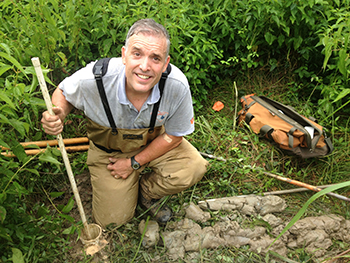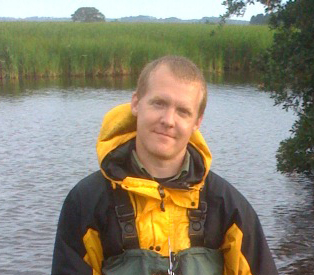Calvin Sawyer, Ph.D.
 Cal Sawyer is a Professor in the Department of Agricultural Sciences at Clemson University and the Associate Director of Clemson’s Center for Watershed Excellence. He coordinates development and implementation of numerous Extension projects, including South Carolina's Certified Erosion Prevention and Sediment Control Inspector program. Sawyer routinely provides water quality and stormwater-related information to various clientele groups, including homeowners, community and government officials, public works and planning staffs, engineers, landscape architects, developers, contractors and other professional decision-makers. He has taught or co-taught nine (9) undergraduate and graduate courses at Clemson, including Soil and Water Conservation, Nonpoint Source Management in Engineered Ecosystems, Vegetative Succession in Restored Ecosystems and Special Problems in Agricultural Mechanization and Business. His applied research interests include sediment-bacteria dynamics, turbidity reduction, low impact development and watershed management.
Cal Sawyer is a Professor in the Department of Agricultural Sciences at Clemson University and the Associate Director of Clemson’s Center for Watershed Excellence. He coordinates development and implementation of numerous Extension projects, including South Carolina's Certified Erosion Prevention and Sediment Control Inspector program. Sawyer routinely provides water quality and stormwater-related information to various clientele groups, including homeowners, community and government officials, public works and planning staffs, engineers, landscape architects, developers, contractors and other professional decision-makers. He has taught or co-taught nine (9) undergraduate and graduate courses at Clemson, including Soil and Water Conservation, Nonpoint Source Management in Engineered Ecosystems, Vegetative Succession in Restored Ecosystems and Special Problems in Agricultural Mechanization and Business. His applied research interests include sediment-bacteria dynamics, turbidity reduction, low impact development and watershed management.

 Jeremy Pike is an Extension Associate in the Department of Agricultural Sciences at Clemson University. He has numerous years of construction and construction management experience as well as over 20 years of research experience at Clemson. His research has focused on water quality and aquatic community responses in relationship with landscape stressors, the majority of which have been related to sedimentation. He has instructed numerous undergraduate and graduate courses including Stream Ecology, Wetland Ecology, Watershed Management and Techniques in Natural Resources. Additionally, he has presented at national, state, and local meetings on topics including stream restoration, water quality and wetland management. Pike joined the CEPSCI team in 2014, where he instructs and serves as program manager.
Jeremy Pike is an Extension Associate in the Department of Agricultural Sciences at Clemson University. He has numerous years of construction and construction management experience as well as over 20 years of research experience at Clemson. His research has focused on water quality and aquatic community responses in relationship with landscape stressors, the majority of which have been related to sedimentation. He has instructed numerous undergraduate and graduate courses including Stream Ecology, Wetland Ecology, Watershed Management and Techniques in Natural Resources. Additionally, he has presented at national, state, and local meetings on topics including stream restoration, water quality and wetland management. Pike joined the CEPSCI team in 2014, where he instructs and serves as program manager. Mack Granger is an Extension Associate in the Department of Agricultural Sciences at Clemson University. Prior to joining the CEPSCI team in 2024, he served as a level II regulatory inspector for the State of North Carolina where he conducted compliance inspections under four regulated programs: erosion & sediment control, industrial stormwater, dam safety, and mining. He has also served as the lead field consultant for stormwater, erosion and sediment control for the Mid-eastern region, providing clientele work for residential and commercial construction throughout the area. His research has focused on the effects that forest fragmentation and timber removal have on available foraging habitat for wildlife. Additionally, he has taught undergraduate coursework in human biology and genetics
Mack Granger is an Extension Associate in the Department of Agricultural Sciences at Clemson University. Prior to joining the CEPSCI team in 2024, he served as a level II regulatory inspector for the State of North Carolina where he conducted compliance inspections under four regulated programs: erosion & sediment control, industrial stormwater, dam safety, and mining. He has also served as the lead field consultant for stormwater, erosion and sediment control for the Mid-eastern region, providing clientele work for residential and commercial construction throughout the area. His research has focused on the effects that forest fragmentation and timber removal have on available foraging habitat for wildlife. Additionally, he has taught undergraduate coursework in human biology and genetics